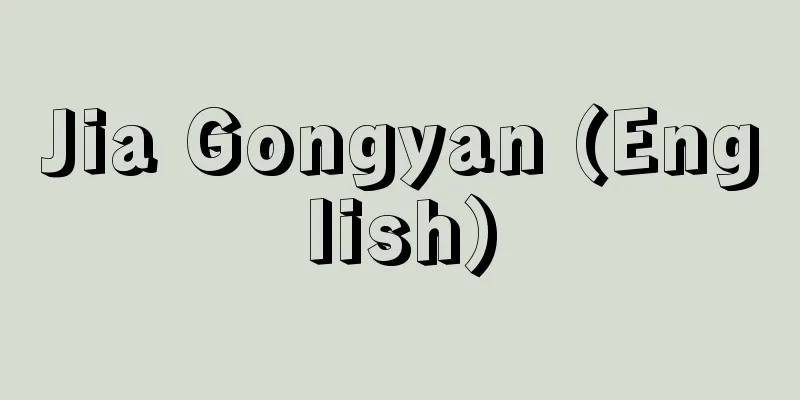Economic law

|
It is a general term for laws that aim for the state to interfere with the national economy in order to stabilize and develop the national economy, and there is no law in Japan with the name of Economic Law. Economic Law is a term used in academic circles, and is often used as an alternative to the Antimonopoly Act, which is essentially the most representative economic law. This tendency is particularly strong in book titles and university lecture titles, so care must be taken. Originally, it was believed that in a capitalist society, the market's automatic adjustment function, symbolized by Adam Smith's idea of the "invisible hand," would function, and product prices and production volumes would be determined by the balance of supply and demand in the market. If this function of capitalism were to function effectively, the state would only need to establish rules for resolving disputes between private individuals, such as civil and commercial law, and maintain public order through criminal law. In other words, the role of the state would be limited to minimal public order and national defense, and would be a "night watchman state" that would not intervene in the economic activities of its citizens. However, in the United States, the rapid development of capitalism gave rise to companies that monopolized the market, proving that the self-regulating mechanism is not omnipotent (market failure). As a result, the need for policies to prohibit market monopolies and cartels by companies and ensure fair competition was recognized, leading to the enactment of the Sherman Act (antitrust law) in 1890. Meanwhile, in Germany and Japan, various laws were enacted as wartime economic control policies during World War II (Essential Industries Control Act, National Mobilization Act, etc.) with the aim of concentrating the national economy on military industries. Although the backgrounds and objectives of each country's policies differed, in any case, a legal basis was needed for the state to directly interfere in the national economy, and such laws were collectively referred to as economic law. In Japan, under the guidance of the Supreme Commander for the Allied Powers (GHQ) after the Second World War, laws aimed at controlling the wartime economy were abolished, and the Antimonopoly Act (1947) was enacted, modeled on the Antitrust Act, to prohibit market monopolies, cartels, and unfair trade practices, and to ensure fair competition between companies. However, it was thought that laws to maintain competitive order alone would be difficult to revive the exhausted economy after the war and to overcome structural recession, so many economic laws (such as the Import and Export Transactions Act, the Temporary Measures Act for Facilitating Industrial Structure Transformation, and the Small and Medium Enterprise Financing Facilitation Act) were enacted as the basis for economic policies to protect and develop the industrial sector. In addition, various domestic trade laws (such as the Customs Act and Customs Tariff Act) that were enacted based on international rules such as GATT (General Agreement on Tariffs and Trade) and its successor, the WTO (World Trade Organization), as well as laws aimed at protecting consumers, were also considered to belong to economic law, and the scope of economic law came to be understood very broadly. In recent years, the Japan-US Structural Initiative (1989) has led to growing criticism of distribution and trade practices between Japanese companies, and the role of the Antimonopoly Act has been reaffirmed and its regulations and enforcement strengthened. In addition, deregulation policies have introduced the principle of competition into the electricity and telecommunications sectors, which were previously monopolized as public utilities, and new policies have been promoted, such as the opening up of existing electric power companies' networks with the liberalization of power generation and sales, and the establishment of various business laws (Electricity Business Act, Telecommunications Business Act, etc.) to ensure connections to lines owned by existing companies such as Nippon Telegraph and Telephone Corporation (NTT) with the aim of promoting competition in the telecommunications sector. It can be said that expectations are rising for economic law, which plays a role in maintaining and promoting competitive order. [Ken Kanazu] "An Outline of Economic Law, by Matsushita Mitsuo, 2nd Edition (1995, University of Tokyo Press)" ▽ "Lectures on Economic Law, by Masada Akira (1999, Nippon Hyoronsha)" ▽ "Economic Law Lectures 1: Theory and Development of Economic Law, edited by the Japan Economic Law Association (2002, Sanseido)" ▽ "New Edition: Essentials of Antimonopoly Law, by Tanihara Osami, 2nd Edition (2010, Chuo Keizaisha)" ▽ "Economic Law, edited by Negishi Satoshi and Sugiura Ichiro, 5th Edition (2010, Horitsu Bunkasha)" [References] | | | | | |Source: Shogakukan Encyclopedia Nipponica About Encyclopedia Nipponica Information | Legend |
|
国民経済の安定と発展を図るため、国家が国民経済に干渉することを目的とした法律の総称であり、日本において経済法という名称の法律が存在するのではない。経済法は講学上の呼称であり、実質的に経済法を代表する独占禁止法をいいかえて用いられることも多く、とくに書名や大学等の講義名の場合にはその傾向が強いので注意が必要である。 本来、資本主義社会においては、アダム・スミスの思想である「見えざる手」に象徴されるような市場の自動調節作用が機能し、商品価格や生産量は市場における需要と供給のバランスにより決定されると考えられていた。このような資本主義の機能が有効に作用すれば、国家は民法、商法などの私人間における紛争解決ルールの整備と刑法などを通じた治安維持を行えばよいことになる。すなわち、国家の役割は最小限の治安と国防にとどめ、国民の経済活動には介入しないことをよしとする、「夜警国家」である。 ところが、アメリカにおいては、資本主義の急速な発展に伴い市場を独占する企業が誕生し、自動調節作用は万能でないことが証明された(市場の失敗)。そのため、企業による市場の独占、カルテルを禁止し公正な競争を確保する政策の必要性が認識され、1890年シャーマン法(反トラスト法)の制定に至った。一方で、ドイツや日本では第二次世界大戦期において軍事産業に国民経済を集中させる目的から、戦時経済統制政策としてさまざまな法律が制定された(重要産業統制法、国家総動員法など)。各国の政策の背景と目的は異なるが、いずれにせよ国家が国民経済に直接干渉するには法律的根拠が必要であり、このような法律を経済法と総称していた。 日本においては、第二次世界大戦後にGHQ(連合国最高司令官総司令部)の指導の下、戦時経済を統制する目的の法律は廃止され、反トラスト法を手本として、市場の独占、カルテル、不公正な取引方法を禁じ、企業間の公正な競争を確保することを目的とした独占禁止法(1947)が制定された。しかし、競争秩序を維持する法律だけでは戦後の疲弊した経済の復興や、構造不況からの脱却は困難と考えられ、産業界を保護、育成するための経済政策の根拠となる経済法(輸出入取引法、産業構造転換円滑化臨時措置法、中小企業金融円滑化法など)も多く制定されている。また、ガット(GATT=関税および貿易に関する一般協定)やそれを引き継いだWTO(世界貿易機関)などの国際ルールを反映して制定された各種の国内通商法(関税法、関税定率法など)や、消費者保護を目的とした諸法も経済法に属する法律と考えられ、経済法の範囲は非常に広くとらえられるようになる。 近時では、日米構造協議(1989)を発端として、日本の企業間における流通・取引慣行に対する批判が高まり、独占禁止法の役割が再認識され規定・運用が強化されている。また、従来は公益事業として独占が認められていた電気、電気通信分野などにも規制緩和政策により競争原理が導入され、発電、売電の自由化に伴う既存電力会社のネットワークの解放や、電気通信分野の競争促進を目的として、日本電信電話株式会社(NTT)などの既存会社が保有している回線への接続を確保する各事業法(電気事業法、電気通信事業法など)が整備されるなど、新たな政策も推進されており、競争秩序の維持、促進の役割を担う経済法への期待が高まっているといえよう。 [金津 謙] 『松下満雄著『経済法概説』第2版(1995・東京大学出版会)』▽『正田彬著『経済法講義』(1999・日本評論社)』▽『日本経済法学会編『経済法講座1 経済法の理論と展開』(2002・三省堂)』▽『谷原修身著『新版 独占禁止法要論』第2版(2010・中央経済社)』▽『根岸哲・杉浦市郎編『経済法』第5版(2010・法律文化社)』 [参照項目] | | | | | |出典 小学館 日本大百科全書(ニッポニカ)日本大百科全書(ニッポニカ)について 情報 | 凡例 |
<<: Economics Summary - Keizaiyouryaku
Recommend
Conquest of Koshu
This is the battle in 1582 (Tensho 10) in which Od...
Sir Robert Anthony Eden, Earl of Avon
British politician. He served in the First World ...
Ryukan
A monk of the Heian and Kamakura periods. One of ...
Parish register
…The ancient village community meetings, where th...
False negative rate
...If the cytology test results in class III, IV,...
Temporary Discharge - Karitaiin
A type of parole. A provisional release of a juven...
Eichler, AW - Eichler
…They were treated as 1/3 of the plant kingdom. I...
Wolf phobia
...A Russian patient who was directly psychoanaly...
Boil - Follicle
Also called boils, they are commonly called nebut...
Judgment
...The Asen dynasty, which inhabited the area sou...
sauce soubise (English spelling) saucesoubise
…It is used in cream stews, gratins, cream croque...
Line capacity - line capacity
…In practical communication channels, the capacit...
fancy-leaved geranium
...In addition to single-flowered varieties, ther...
Credit and Debt - Saikensaimu
A right that a specific person (creditor) has to d...
Takechi Zuizan
Year of death: Keio 1, leap year 5, 11 (July 3, 18...









